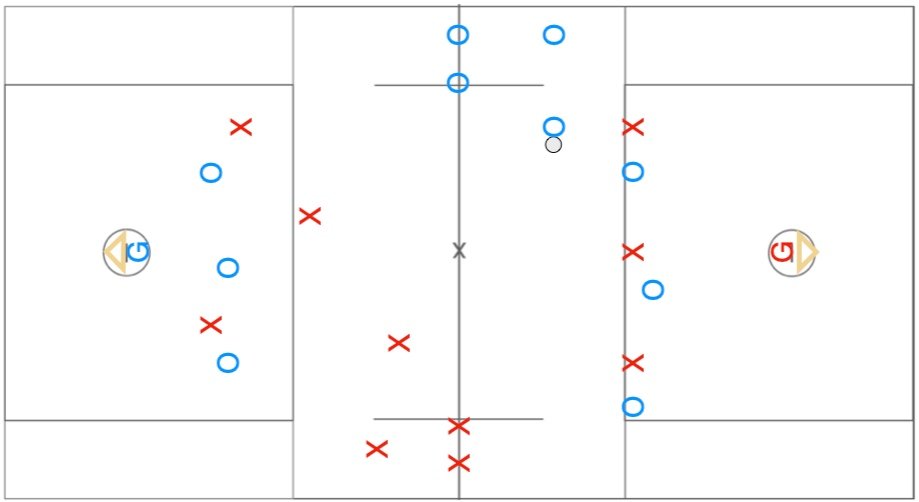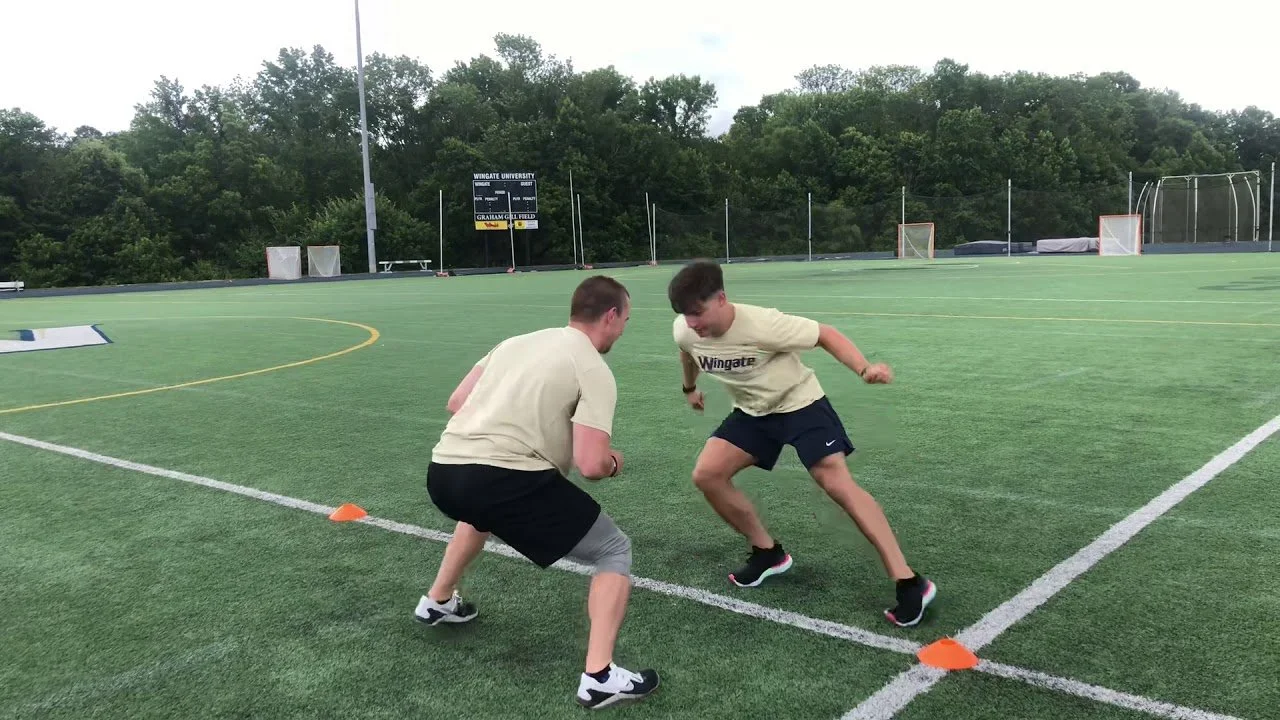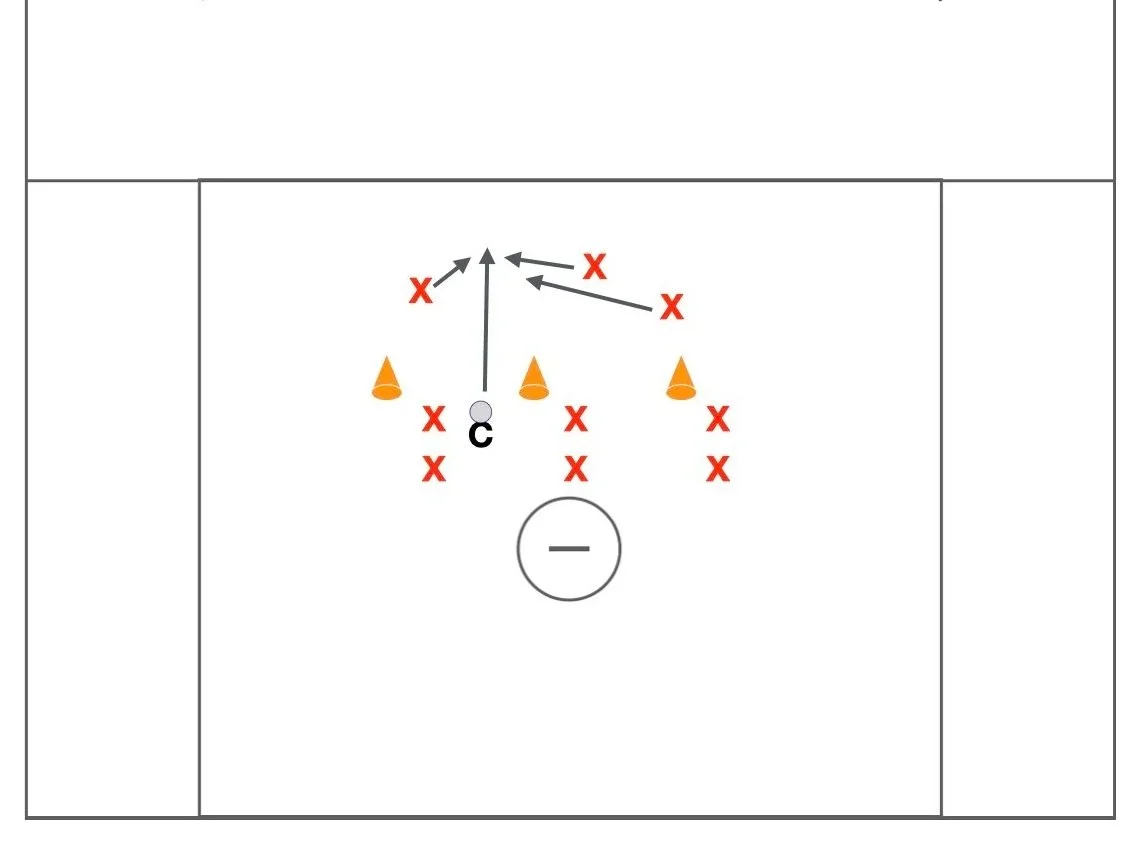Progressions to Teach Stick Checks: Figure 8s, Ws, and Ms
These drills teach players how to separate their arms from their body when throwing stick checks.
Players practice three patterns: Figure 8s, Ws, and Ms, each designed to improve arm independence and stick quickness.
These simple drills help coaches build strong habits before adding real defensive pressure.
Butt-to-Butt Drill: Building Ground Ball Strength and Awareness
The Butt-to-Butt Drill, also known as the Back-to-Back Drill, helps players develop body control, level changes, and ground ball awareness. This competitive and physical exercise teaches girls how to scoop the ball under pressure and run away from defenders after gaining possession.

Tight Cradle and Strong Finish: Controlling the Stick Through Contact
This drill focuses on maintaining a tight cradle while driving toward the goal and finishing under pressure. Players learn to keep their top hand close, protect their stick from checks, and explode through contact for a powerful finish.

Zipping the Pass Through X Timing, Angles, and Separation
Executing a fast and accurate pass through X is key to maintaining offensive rhythm. This drill helps attackers read defenders, create separation, and deliver sharp feeds under pressure.

Midfield Mastery: On-Sides / Off-Sides Transition Drill
This drill is a fun, high-energy way to teach players how to use the midfield line strategically during clears and rides. It reinforces offside awareness while helping players understand how to manipulate field positioning to their advantagein transition.

Full Field Fast Breaks with a Trailer
Boost your team’s fast-break skills with this high-intensity lacrosse drill! Players sharpen decision-making and communication under pressure as a trailing midfielder forces quick, game-like transitions. The added time crunch keeps everyone on their toes, driving faster offensive plays and defensive coordination.

C-Cut Quick Release Drill
This drill enhances players’ ability to make sharp cuts and quickly release accurate shots under game-like conditions. It emphasizes speed, precision, and instinctive decision-making, helping players improve their shooting effectiveness under pressure.

Mirrors in Motion: A Fun and Simple Warm-Up Drill
The Mirrors in Motion drill is a warm-up designed to get players moving, thinking, and connecting with teammates. In pairs, one leads with creative movements while the other mirrors them like a reflection. After short intervals, they switch roles and partners. This quick and fun drill improves focus, agility, and teamwork right from the start of practice.
The Mirror Drill: Building Vision, Footwork, and Communication
The Mirror Drill is a simple yet powerful exercise that helps players improve their off-ball movement and communication. One player makes a hard split to the island (5x5), while the partner mirrors by cutting opposite and staying connected to the play. This drill develops timing, vision, and realistic game-like offensive movements.

123 Box Slide Drill
As coaches we often work hard on a defined slide package, or multiple slide packages in our lacrosse drills. Maybe you are a crease slide guy, or a coma slide guy, or even an adjacent slide guy. In addition to working on the slide, this lacrosse drill really emphasizes the slide and the recovery.

3 Man Ground Ball Elimination
A simple but effective twist on a traditional ground ball drill to make sure every player practices ground ball technique. All too often when we do one vs one or two vs two ground ball drills the losers never actually practice picking up a ball, rolling away and making a pass.

Break out and clear long passing drill
The idea is to use more of the field to make the passes longer while throwing to players breaking up the field much like in real games.
How to Teach Triangle Passing: Improve V-Cuts, Ball Protection, and Quick Decisions
The Triangle Passing Drill teaches players how to move the ball, use V-cuts, and square up to see the field. It builds vision, timing, and game awareness.
9 Ways To Speed Up Practice
If you want to know if your practice is going too slow, ask yourself this: "How many reps can a player get in your practice?" To answer this question, one day pick a player out, count how many touches that players gets in practice (on ball defense can count as a touch). You may be shocked at the result. The problem can be solved with a little preparation. I hope these 9 tips helps you out in making practice go a little faster!

Dodge Slide And Recover Drill
Timing and communication are essential for an effective slide. The defender must slide at the right moment to avoid leaving their own man open, and the other defenders must communicate the slide to ensure that the player being slid to is ready to pick up the open offensive player. This drill is a great way to practice this technique.
Wall Ball Routine: Daily Stickwork Workout
A wall ball routine is essential in girls lacrosse because it builds stick skills, hand-eye coordination, and muscle memory through consistent repetition. It also develops confidence and quick decision-making under pressure—both crucial for game-day performance.
Lateral Movement Drill for Defensive Fundamentals in Youth Lacrosse
This lateral movement drill with and without a stick teaches body positioning, stick control, and direction changes for lacrosse defense. Ideal for beginners learning one-on-one fundamentals.

Umbrella Drill for Men’s Lacrosse: Build Team Defense and Positioning
The Umbrella Drill teaches defenders how to guide attackers toward the sidelines, deny the middle, and communicate as a unit.
Zigzag 1v1 Cone Drill for Men’s Lacrosse: Improve Footwork and Reaction
The Zigzag 1v1 Cone Drill helps defenders build reactive footwork, drop step control, and stick pressure while shadowing a moving attacker.
Master Drop Step Technique for 1v1 Defense in Men’s Lacrosse
The Drop Step Drill is essential for men’s lacrosse defenders looking to improve reaction time, footwork, and stick control during 1v1 situations.

